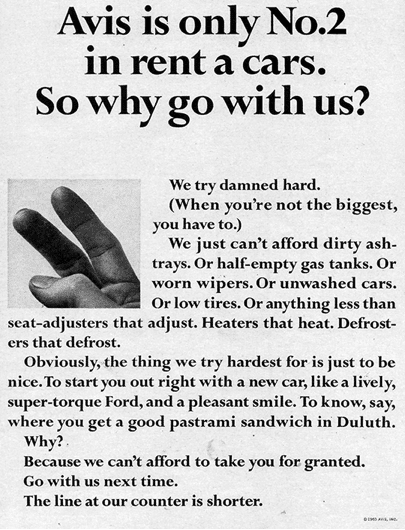The year was 1962 and after over a decade of financial losses, the Avis car rental company went with a brand new marketing approach. Avis took the fact that they were “only No. 2” and turned it into their unique selling proposition. The result: within one year, Avis went from being $3.2 million in the red to $1.2 million in the black.
What made this marketing piece work so well? Transparency
 Compared to most advertising during this era, Avis’s campaign was definitely ahead of its time. But if you’ve been following the current trends in marketing, the big buzz words are “transparency” and “honest marketing.” Gone are the days when a business can simply use words like “best,” “fastest” or “greatest” without backing the information up with proof.
Compared to most advertising during this era, Avis’s campaign was definitely ahead of its time. But if you’ve been following the current trends in marketing, the big buzz words are “transparency” and “honest marketing.” Gone are the days when a business can simply use words like “best,” “fastest” or “greatest” without backing the information up with proof.
Today’s consumers will not settle for anything less than honesty when it comes to businesses marketing their products and services – and they are armed with tools to do their research. With the help of online reviews and social media, a smart shopper will know lots about you and your business long before they step foot through your front door.
In their book, Extreme Trust: Honesty as a Competitive Advantage, authors Don Peppers and Martha Rogers stress how important it is for businesses to gain the trust of their customers – or else they’ll quickly find themselves out of business.
“Not so long ago, being reasonably trustworthy was good enough. But soon only the extremely trustworthy will thrive. Extreme trust means giving customers the same kinds of considerations you would want to have yourself – honesty, straightforwardness, and looking out for the other's interest.”
Show off your strengths but don’t hide from your weakness.
Instead of hiding from the fact that they were not the biggest car rental company, Avis focused on how being second made them have to try harder. They were even bold enough to take what could be perceived as a weakness – shorter lines – and turn it into something for people to look forward to.
In the world of commerce, trust has become a much more personal thing and the key to earning trust with today’s consumers is being transparent.
Yes, we want our customers to know what we are good at, but if there is something that we don’t do well, no amount of hiding it is going to stop people from finding out. Take the time to evaluate what you do best but also make sure you understand what kind of things are not your strong points.
Find a way to show off all of your business both sides of your business, for example:
- We may take longer to get the job done, but that’s because we don’t take any shortcuts.
- Our pizza takes more then 30 minutes to deliver, but that’s because we make it fresh just for you.
- We’re sorry that you have to wait in line, but we promise it’s going to be worth the wait.
- We might be slow but you'll love the taste of our food.
- Yes, we may charge more than the big box stores – but that’s because of the personal attention that we give to every one of our customers.
Or take inspiration from these examples!



People know that no business is perfect – so don’t pretend to be!
No matter how good you are at what you do, there will be mistakes made. Instead of hiding those little blemishes, bring them to light and let people know how they were handled. Studies show that only 4% of unhappy customers will actually tell businesses when there is a problem. The other 96% will keep it to themselves and 91% will never come back. And what’s worse is the fact that, depending upon how bad things were, a typical dissatisfied customer will tell an average of eight people about his negative experience with a business.
For those customers who do take the time to tell someone about their problem, if there is a successful resolution in their favour, 70% will come back and continue to do business. This number jumps to 95% if the complaint is resolved right away.
So the next time a customer comes to you with a problem, embrace it not only as a learning opportunity but also as an opportunity to let others know that you are a business that listens.
Go ahead and publicise both the problem and the resolution. Let customers know that your business welcomes complaints and treats each one as a chance to learn how you can better serve your customers. Invite people to let you know if they were happy with the way their complaint was handled and ask for permission to share their story.
When people see that you have a history of dealing with problems effectively, not only will the number of customers who go away unhappy without telling anyone decrease, but you will also draw in new customers who appreciate your honesty and commitment to making things right.
Let consumers know the “people” behind the business.
Businesses today have a tool that was not available to Avis in 1962 – social media. But could you imagine how much more powerful that campaign would have been with silly Instagram pics of employees going the extra mile to make sure vehicles were clean, tweets about how there is currently “no wait”, Facebook posts from staff sharing personal travel tips and holiday recipes and online reviews from real customers backing up their claims.
For small businesses, social media provides an opportunity to develop a more personal relationship with consumers – one that goes beyond the business transaction. Don’t just use social media to promote purely business related information. Use it to let consumers get to know you and your staff as people and to engage them in conversations. Interact with people on social media and let them see the “real” you. Yes, your posts should be professional but that doesn’t mean you can’t have fun with them.
Ultimately, when it comes to the longevity of your business, it will always come down to one thing – are your customers happy and satisfied with your product or service?
Yes, advertising and promotion will help to get people in the door but it is YOU who will make them stay. A business whose marketing information matches or exceeds the consumer experience will be way ahead of the game. Be honest about who you are. Your customers will appreciate it.
PS – Here's an interesting interview with the authors of Extreme Trust:












Leave a Reply